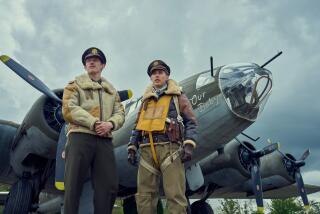Familiar Ken Follett Formula Takes to Skies : NIGHT OVER WATER, <i> by Ken Follett,</i> William Morrow, $23; 400 pages
- Share via
Ken Follett continues to harvest his increasingly familiar formula for pseudo-Gothic thrillers thick with people and events that cavort and interlock without once losing cadence or relevance.
In “Night Over Water,” Follett rounds up the usual cast of caricatures who once again stop just short of being cartoons.
Center stage is a clot of British aristocracy stalked by a young jewel thief with a heart harder than diamonds. Except when he’s playing slap and tickle with Lady Margaret Oxenford.
This Noel Coward lot is joined by a runaway wife who keeps changing her mind about running away; her new lover, who seems more bemused than besotted; and cuckolded husband Mervyn, who is in hot pursuit of his wife. He says he can’t live without her--then meets a rich American woman and in the space of a few hours they have merged bodies, businesses and bankrolls. Till death do them part. Or maybe a Chapter 11.
We are introduced to several fliers with hydraulic fluid in their veins. Also doughty G-men, Jimmy Cagney gangsters and a political villain who utters lines snitched from the Green Hornet: “You can fly . . . over the navy cutter that the treacherous Eddie Deakin has summoned to trap us.”
This guy also hums Beethoven.
Their lives emerge at distant points in England in the late ‘30s. Their ambitions and personal traumas lightly overlap before converging on a single place and one point in time. In this case, it’s the Art-Deco interior of a Pan American Clipper flying between Portsmouth and New York two days after the declaration of World War II.
There’s sex, of course, and in hot dollops. Before the flight. On the flight and during fuel stops. There are anxious partners surrendering their mores, the gentle deflowering of Lady Margaret, even the reawakening of a celibate widow who becomes enraptured by the retroactive raunchiness of it all.
The book pivots on a plot to divert the Clipper so that agents of the German-American Bund can grab a fleeing physicist and ship him back to Nazi Germany. That makes the work more soap opera than serious literature.
Follett’s style is to write without nuance. His characters, their thoughts, deeds and environs are presented in black or white. Then the author pounds out a solid, graphic yarn around reliable stereotypes with a quick twist in the tail before a passably happy ending.
He does have a fine eye for settings. With the Orient Express and the Hindenburg having been done to death by other novelists, a thriller around a flight from the romantic era of the Clipper flying boats was almost inevitable for Follett.
The Clippers were four-engined dinosaurs built by Boeing for Pan American’s daring first attempt to provide luxury air travel between Europe and the United States.
But World War II collapsed the little era. The Clippers went to war and flew leaders of the Allies to military meetings and peace conferences. By 1946, faster, cheaper air travel and nonstop flights between international airports had become the peacetime ideal. The outmoded, uneconomical Clippers were beached and dismantled; of 12 Boeing B-314 flying boats built, none survives.
Follett works this romantic stage well. He is sometimes off the technical mark (pistons go up and down in an internal combustion engine, not the cylinders) but he manages to capture the wool-pile, bone china and pastel elegance of Clipper travel.
Also its decadence. Stewards hover compliantly and their provision of Mumms and martinis is endless. Follett remembers the sense of adolescent mischief felt by anyone who has ever slept in a bunk aboard train or plane.
“Night Over Water” will go well with a day on the beach. As a time burner, it beats an afternoon nap but is less enjoyable than P. D. James on “Mystery Theater.” It is not, however, memorable Follett.
Next: Jonathan Kirsch reviews “Walking the Trail: One Man’s Journey Along the Cherokee Trail of Tears” by Jerry Ellis (Delacorte).
More to Read
The biggest entertainment stories
Get our big stories about Hollywood, film, television, music, arts, culture and more right in your inbox as soon as they publish.
You may occasionally receive promotional content from the Los Angeles Times.









